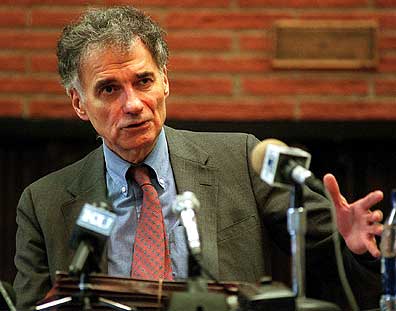The Spectrum/Dialogue Concept Is Key To Power
America is the richest, most powerful country today because it is the oldest democracy. Nepal is two years older than America, but it is one of the poorest. Democracy creates wealth. Democracy is social progress.
After slavery was abolished in America, the country started out on a major industrial trajectory.
After women were granted voting rights, there was another industrial shift. The country took to the air and to the roads. The automobile industry got launched.
The end of segregation brought forth the second industrial revolution.
Bill Clinton's progressive thrust brought forth the dot com boom and the longest peacetime economic expansion in history.
Social progress has to be made on all fronts: race, gender, class. Every time a major leap is taken, it is like breaking a sound barrier. A whole, new positive reality emerges.
That is why we have to figure out the least disruptive ways of making social progress. For me it is almost like the efficiency concept in the world of business.
And it literally is about money, like the guy says in the movie Jerry McGuire: "Show me the mo-ney!"
Social progress benefits both the oppressor and the oppressed. The trick is to show them that is the case. The trick is to show them the money, the promise of it.
And this goes beyond race and gender. This also applies to education, health and free trade. This applies to feeling good about China and India.
I believe I have offered the basic framework: The Spectrum/Dialogue Concept Is Key To Power.
Saturday, November 19, 2005
Lee Metcalf Is A Naderite

I had a rather long conversation with Lee Metcalf at the DFNYC Mixer the other day. This was his first time at a DFNYC event. Some friend of his emailed him the link to the event at the organization's site, and he decided to show up. He is a Ralph Nader guy. Go figure.
I started out not knowing a whole lot about Nader, and that was in 2000. Then I made it a point to learn. A lot of my good friends were really into him. One friend of mine was on Nader's statewide committee for Kentucky in 2000.
What does he stand for? I find few things I disagree on in terms of basic policy. But I lose him on political reality.
Gore is not the greatest guy maybe, but who would you rather have protecting the environment, Gore or Bush? To me that is what it boils down to.
Lee and I honed in on two Nader issues: (1) Public financing of elections, and (2) Universal health insurance. I can not disagree on either. But both are statements of fantassy. What exactly is the policy you are offering?
As in, start by describing the reality as it exists on both today. Then tell me where you want to go, what do we end up with. And then show me the roamap. The Nader crowd does not do any of the three. Because as soon as they looked at the roadmap, they will realize solidly voting Democratic is how you go about it.
It is a choice between, the good, the bad, and the ugly. The Nader prescriptions are good, the Democratic prescriptions are bad, according to the Nader crowd, and the W prescriptions are ugly. They are so mad we can't have the good, they give us ugly.
The conversation is hardly over. And I hope Lee will keep coming to the DFNYC events, and will bring more people along.
He emailed a link to this article earlier: Stand With The People.
And I kind of like it that Nader is an Arab American. That is a freshening difference from the crowd of WASPs. So I got Nader, but on entirely something else.
Subscribe to:
Comments (Atom)